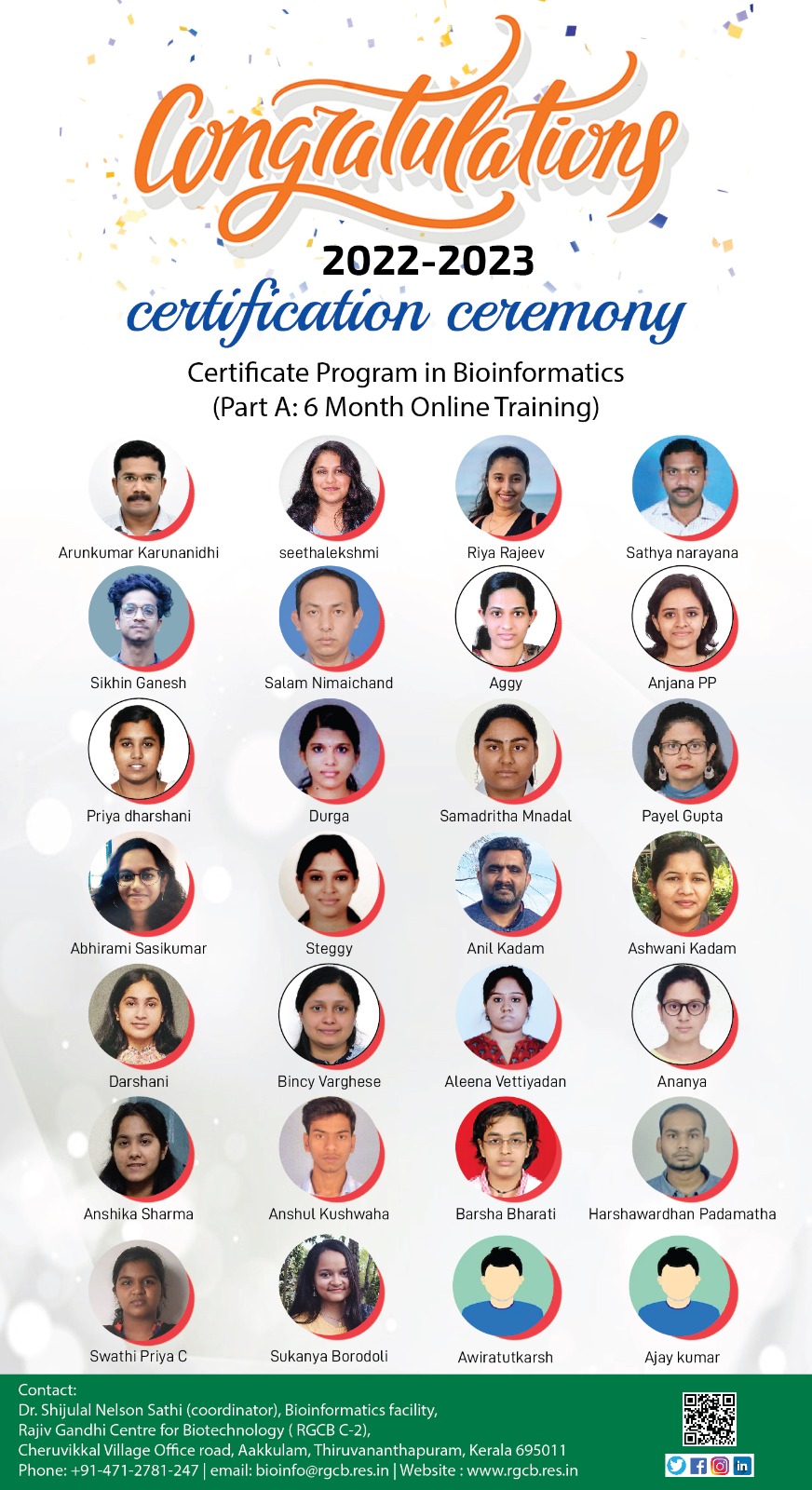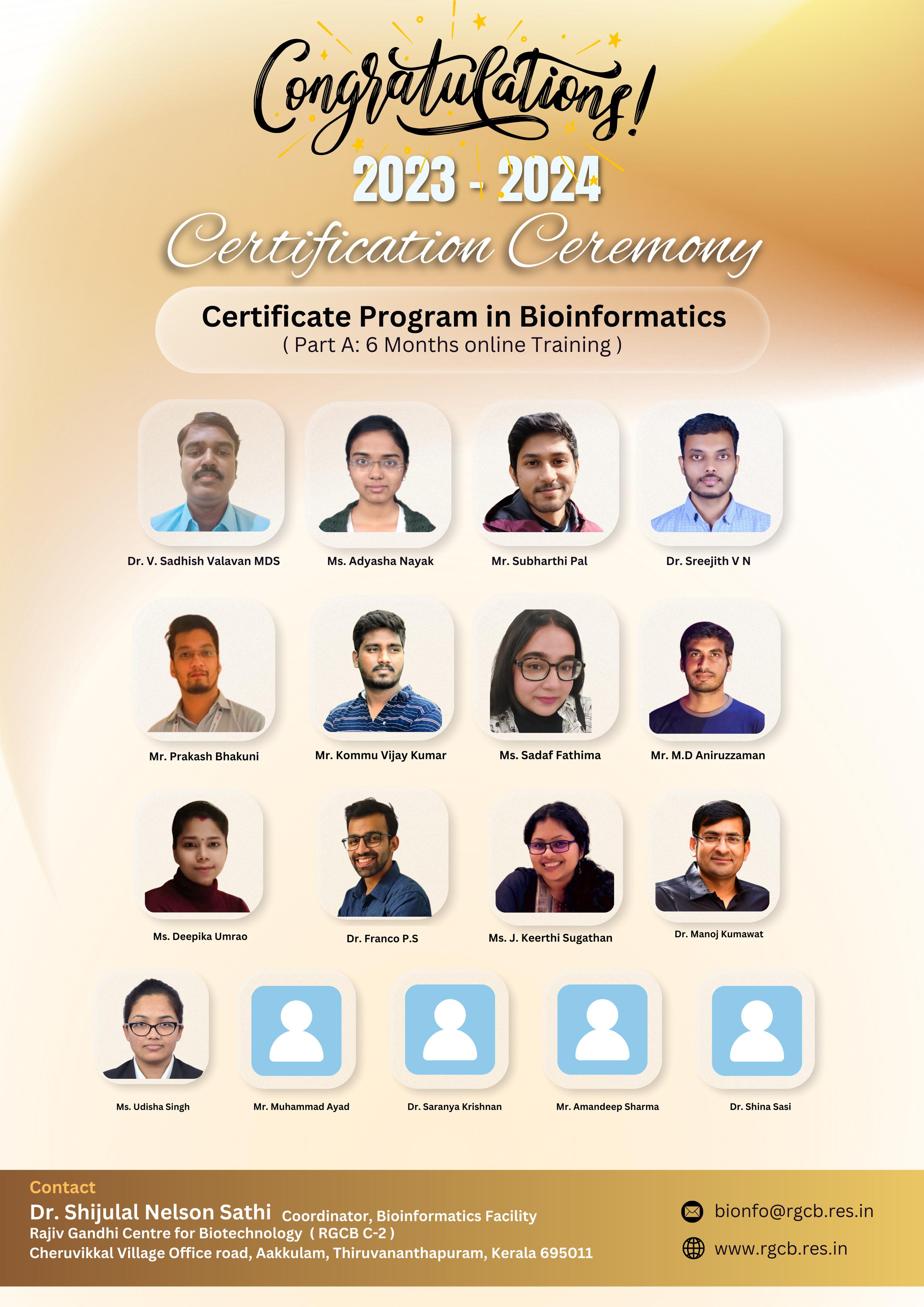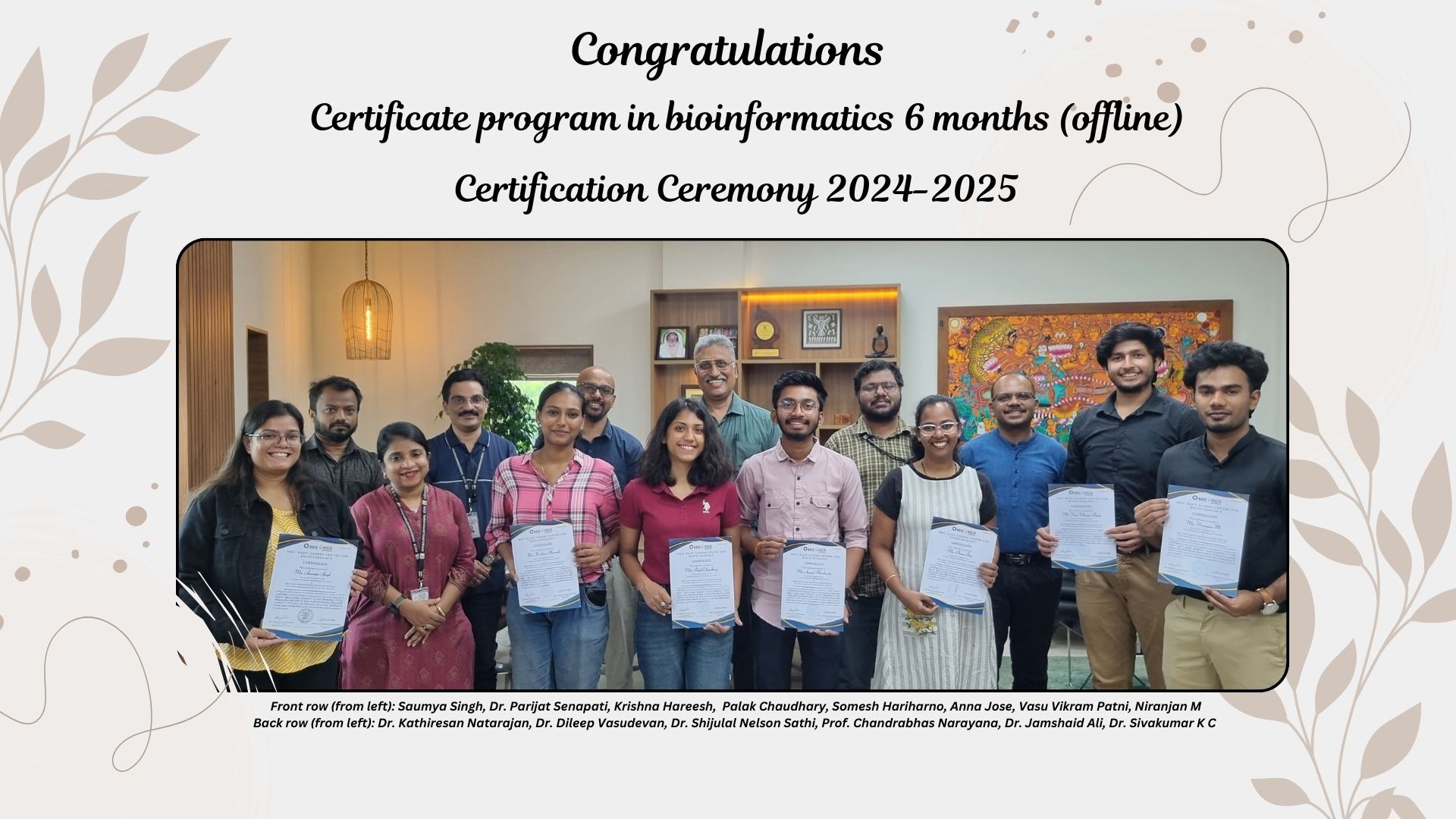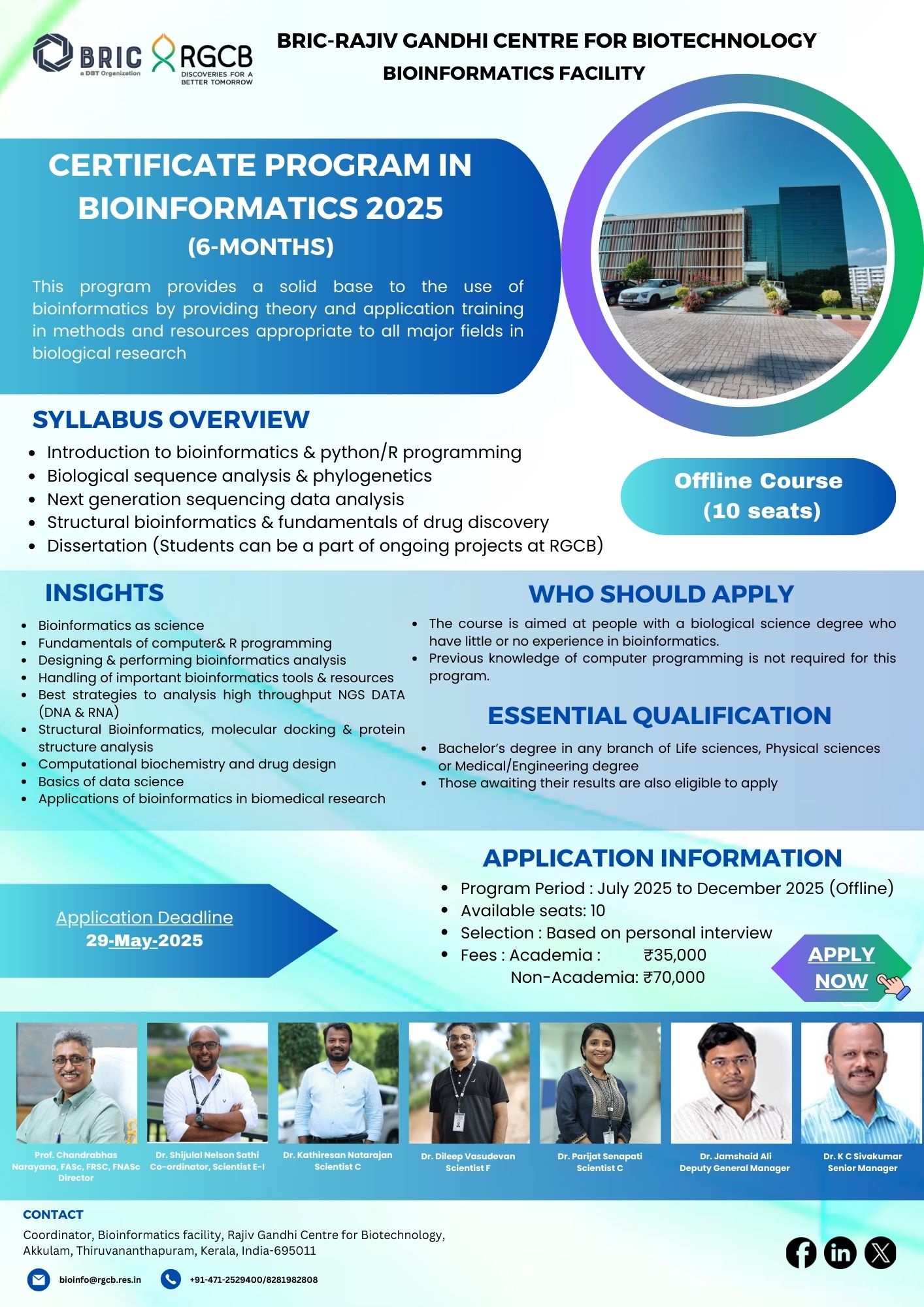BIOINFORMATICS FACILITY
Certificate Program in Bioinformatics 2025 (Six months)
Non-Academia- ₹ 70,000
Venue
Bioinformatics Facility,
BRIC-RGCB,
C2 Campus,
Cheruvikkal Village Office Road,
Aakkulam, Thiruvananthapuram, Kerala - 695011.
+91 471-2529-400
Course Overview
This six month certificate program is a platform for highly motivated students to explore bioinformatics through practical experience. It provides a solid base to the use of bioinformatics by providing theory and hands-on training in methods and resources appropriate to all major fields of biological research. This Program provides best strategies for undertaking bioinformatics analysis, computer programming, statistical analysis, data management and reproducibility. All participants will have close and correct mentoring by RGCB faculty. Special invited lectures will be arranged by distinguished scientists and academicians.
Who should apply?
The Course is aimed at people with a biological science who have little or no experience in bioinformatics. Previous knowledge of computer programming is not required for this program.
Essential qualifications
Bachelor's Degree or Master's degree in any branch of Life Sciences, Physical Sciences or Medical/Engineering Science. Those awaiting their final results are also eligible to apply.
Selection Procedure
The RGCB Academic Committee will screen all applications and potential candidates will be invited for an online interview.
Program Fee
As per the table of fee structure given above. No certificate will be issued without fulfilment of the curriculum & payment of the total fee. Program fees include admission, study materials, access to internal computational facilities and consumables used in the Bioinformatics Facility. It does not cover your travel and local accommodation.
Location
RGCB Campus II
Rajiv Gandhi Centre for Biotechnology (RGCB), Aakkulam
Application
Submit your online application here. Please note, your application will not be considered without a Statement of Purpose (Why you want to get trained in this specialization?) & resume.
Faculties:
Scientist E-I & Co-ordinator, Bioinformatics facility

Scientist C

Scientist F

Scientist C
Tutors:

Deputy General Manager (Bioinformatics Operations)

Senior Manager (Technical Services)
Syllabus
Module 1: Introduction to bioinformatics & python/R programming
Understanding the Linux/UNIX environment and its importance in bioinformatics; Basic command line operations such as file manipulation, directory navigation, and text processing; Working with remote machines including SSH, file transfer, and data management; Python Programming, covering variables, control structures, loops, and functions; Introduction to the R package, including basic commands, data manipulation, and basic statistics; Generating simple plots and visualizations using R for biological data analysis; Integration of Python and R for bioinformatics applications;
Installation and Setup of Bioconductor: Setting up Bioconductor and relevant R packages for microbiome analysis; Statistical Analysis and Visualization in R: Utilizing R for statistical analysis and visualization of microbiome data;
This module equips students with essential skills in using the Linux/UNIX environment, command line operations, programming in Python and R
Module 2: Biological sequence analysis & phylogenetics
Exploring concepts of homology, similarity, and identity in biological sequences; Understanding scoring matrices and their role in sequence alignment programs; Practical application of sequence alignment tools for biological data analysis; Comparative analysis of sequence alignment algorithms and their performance.
Principles of Molecular Phylogeny: Exploring the principles of molecular phylogeny and its importance in evolutionary biology; Molecular Markers and Tree Construction: Understanding molecular markers, evolutionary models, and methods for constructing phylogenetic trees; Assessing Phylogenetic Errors: Using the bootstrap approach to assess sampling errors in estimated phylogenies; Comparative Analysis of Phylogenetic Methods: Comparing different methods such as parsimony, distance, likelihood, and Bayesian methods for phylogenetic analysis.
Module 3: Next generation sequencing data analysis
3.1 Overview of NGS Platforms: Detailed exploration of platforms such as Illumina, Ion Torrent, and Pacific Biosciences for sequencing; Library Preparation and Sequencing Protocols: Understanding the procedures involved in preparing libraries for sequencing; Quality Control and Data Pre-processing in NGS: Techniques for ensuring data quality and pre-processing steps; Understanding FASTQ Format: Insight into the format used for storing sequence data generated by NGS platforms; Genome Assembly Techniques: Comparison of de novo assembly and reference-based assembly methods; Understanding the Microbiome: Introduction to the microbiome and its significance in biological research; Taxonomic Classification Methods: Overview of methods used for taxonomic classification in metagenomic data; Functional Annotation of Metagenomic Data: Annotation of genes, non- coding regions, and functional elements in metagenomic datasets; Comparative analysis of taxonomic and functional profiles in diverse microbial ecosystems.
3.2 Basics of RNA-Seq Technology: Understanding library preparation, sequencing platforms, and data generation in RNA-Seq; RNA-Seq Datasets and Databases: Exploring public repositories, data formats, and metadata standards for RNA-Seq data; Quality Control and Pre-processing of RNA-Seq Data: Techniques for ensuring data quality and preparing data for downstream analysis; Integration of Multi-Omics Data: Combining RNA-Seq data with other omics data for a comprehensive biological interpretation; Differential Gene Expression Analysis: Methods, statistical models, and significance testing for identifying gene expression changes; Visualization and Interpretation of RNA-Seq Results: Techniques like heatmaps, volcano plots, and pathway analysis for result interpretation; Functional Enrichment Analysis: Analyzing gene expression changes for functional enrichment and biological interpretation; Integration of RNA-Seq Data: Understanding how RNA-Seq data can be integrated with other omics data for insights in systems biology;
This module equips learners with the necessary skills and knowledge to work with NGS data, analyze microbiome samples, perform metagenomic analysis, and interpret taxonomic and functional profiles in microbial ecosystems.
Module 4: Structural bioinformatics & fundamentals of drug discovery
Principles of structural biology, Basics of experimental structural biology techniques (XRD & Cryo-EM) Homology Modeling: Principles, techniques, and applications in predicting protein structures based on known homologous structures; Ab-Initio Modeling: Methods for de novo protein structure prediction and understanding the limitations of this approach; Overview of Structural Databases: Exploration of databases like UniProt and Protein Data Bank (PDB) and their significance in structural bioinformatics; Protein Structure Visualization Tools: Practical use of tools such as PyMOL and UCSF Chimera for visualizing and analyzing protein structures; Ligand Binding Site Prediction: Techniques for identifying and characterizing ligand binding sites within protein structures; Docking Techniques using Vina/Autodock/Patchdock: Application of molecular docking for virtual screening, lead identification, and evaluating ligand binding energies; Evaluation of Docking Algorithms: Assessing the performance of docking algorithms in predicting ligand binding energies and ranking ligands; Role of Molecular Docking: Understanding its importance in structure-based drug design and lead optimization; Introduction to Molecular Modeling Techniques: Covering molecular mechanics force fields, energy minimization, and conformational sampling; Molecular Dynamics Simulations: Principles, algorithms, and applications in studying protein-ligand interactions, flexibility, and dynamics; Application of Artificial Intelligence: Exploring the use of AI in drug design and chemoinformatics for lead optimization and drug discovery.
This module offers a thorough grasp of structural bioinformatics, equipping learners with essential competencies to engage in protein modeling, molecular docking, molecular dynamics simulations, and the incorporation of artificial intelligence in drug discovery endeavors.
For more details contact:
Dr.Shijulal Nelson Sathi
Coordinator, Bioinformatics Facility
Cheruvikkal Village Office Road, Aakkulam, Thiruvananthapuram, Kerala - 695011
bioinfo@rgcb.res.in
Find us here
Our Alumni
